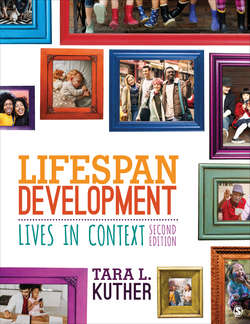Читать книгу Lifespan Development - Tara L. Kuther - Страница 342
На сайте Литреса книга снята с продажи.
Part III Early Childhood
ОглавлениеChapter 7: Physical and Cognitive Development in Early Childhood
Chapter 8: Socioemotional Development in Early Childhood
In early childhood, advances in physical, cognitive, and socioemotional development permit young children to interact with their social world in new ways. With improvements in strength and motor skills, children engage their peers in rough-and-tumble play—games involving chasing, jumping, and play fighting.
Advances in cognitive development help children to become better at attending, planning, and remembering. A developing understanding of the mind helps young children become aware of other perspectives and engage in sociodramatic play—acting out roles, stories, and themes as they pretend to be mothers, astronauts, and cartoon characters.
Interactions with parents are especially important in fostering development. Children respond best to parenting that is warm and sensitive yet firm, relying on discussion and reasoning as discipline tools. Nursery school and preschool programs offer new opportunities to interact with adults and other children. Young children learn how to make and keep playmates, join groups, and manage conflict. In cooperative play, children learn to work with friends to achieve a common goal, express ideas, be assertive, and regulate emotions. Through interactions within the home, school, and peer contexts, young children come to view their worlds and themselves in new ways, providing opportunities to advance physical, cognitive, and socioemotional development.
Images: ©iStock.com
